
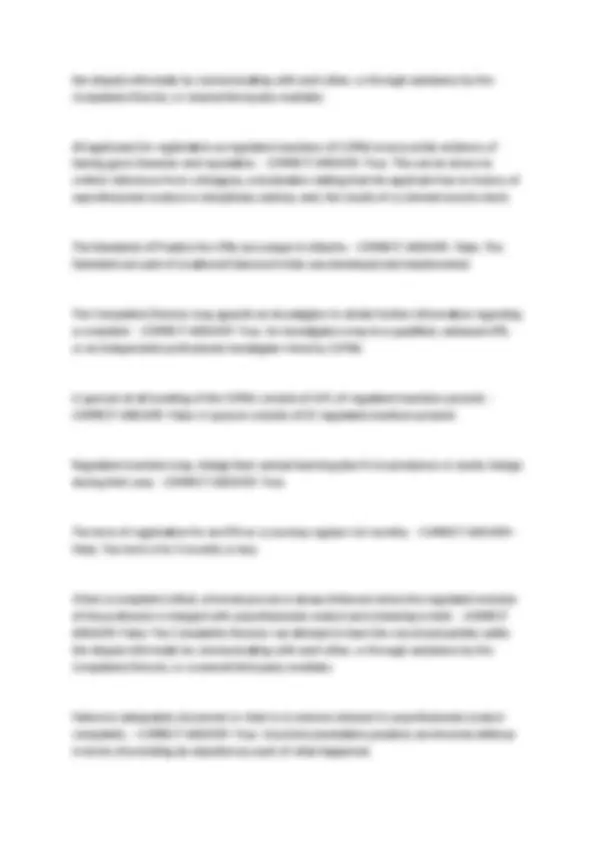
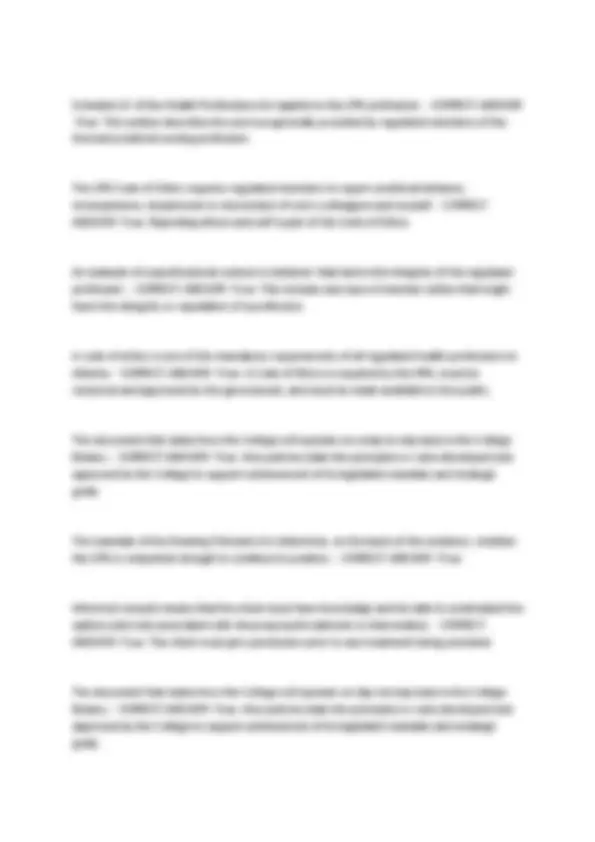
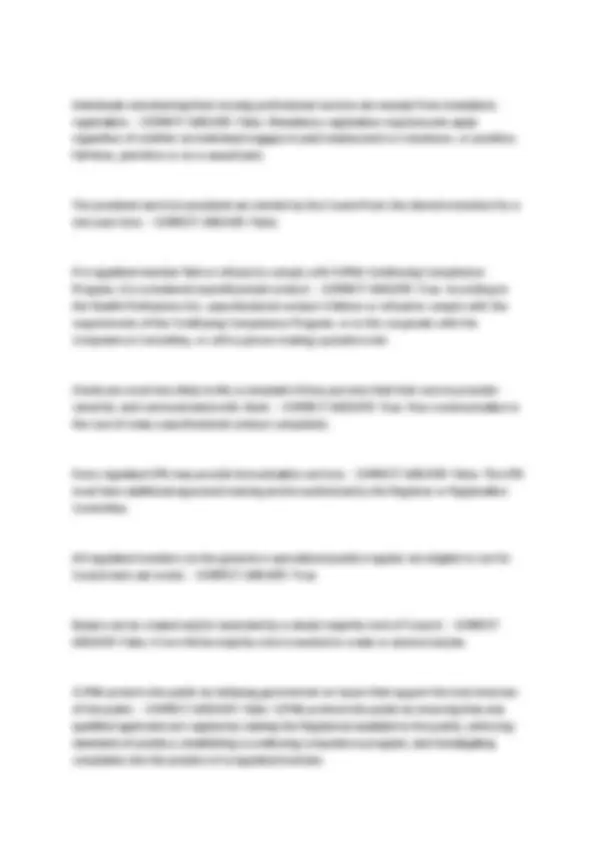
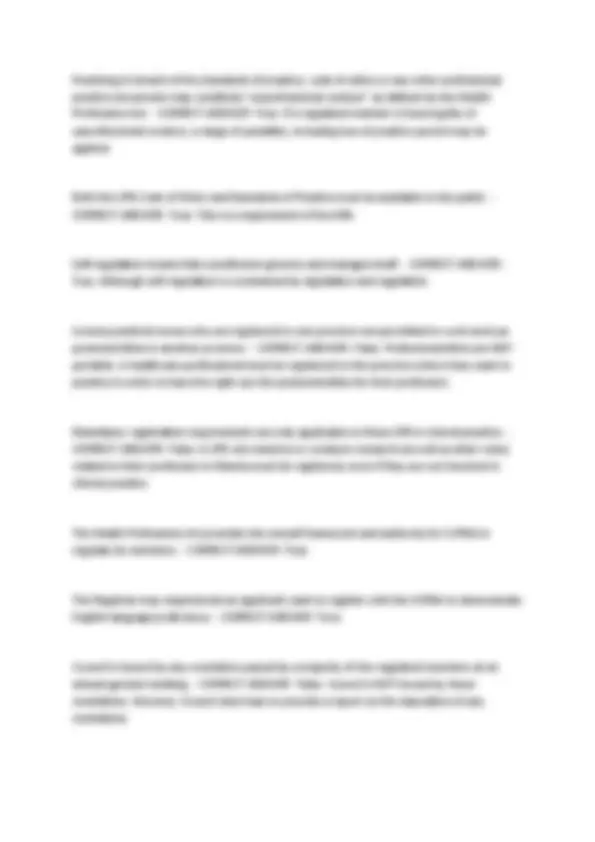
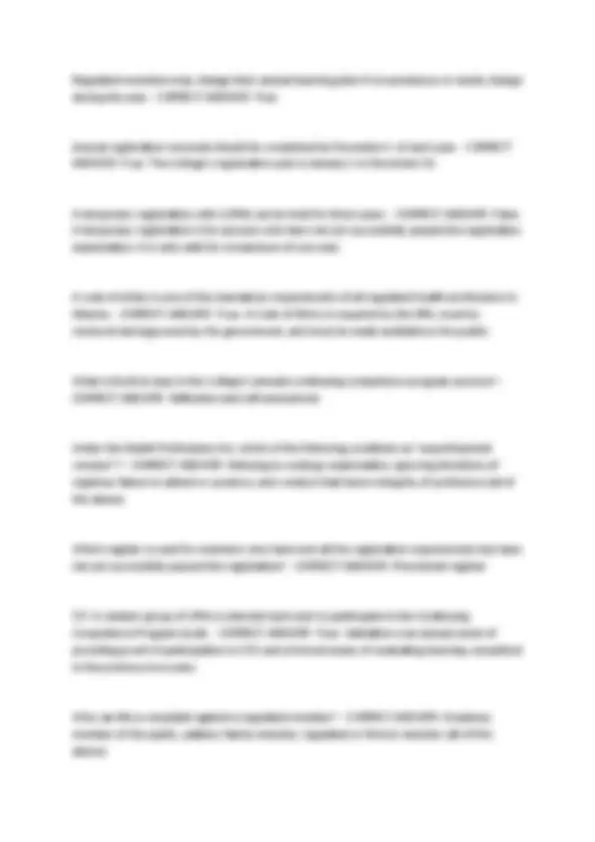
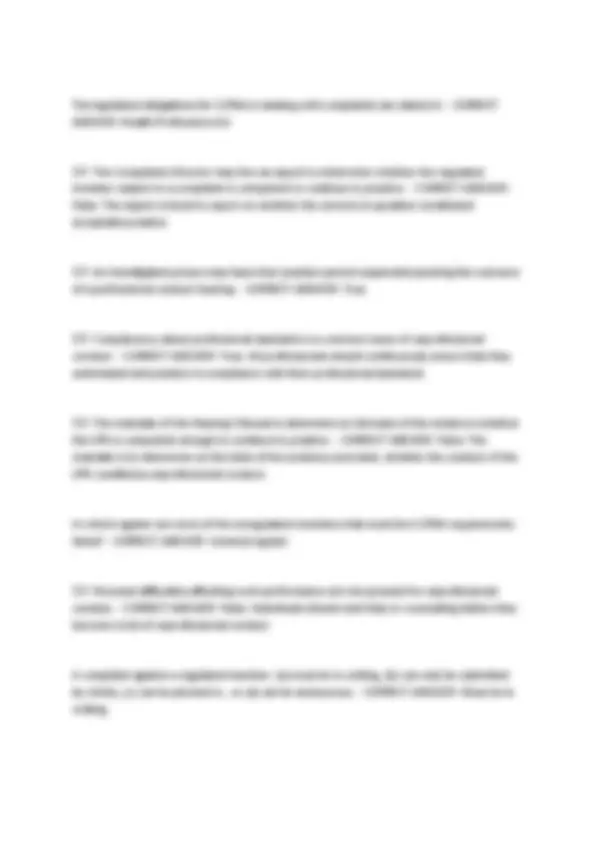
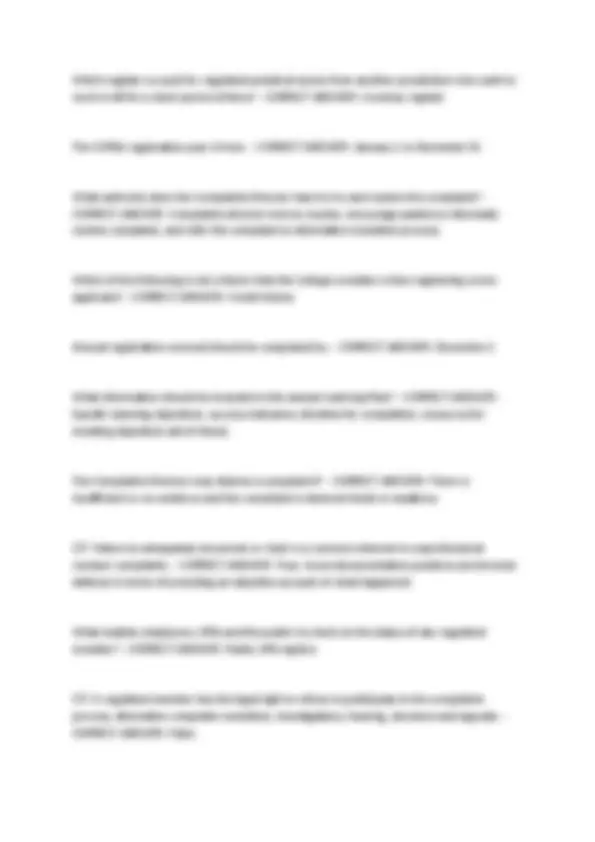
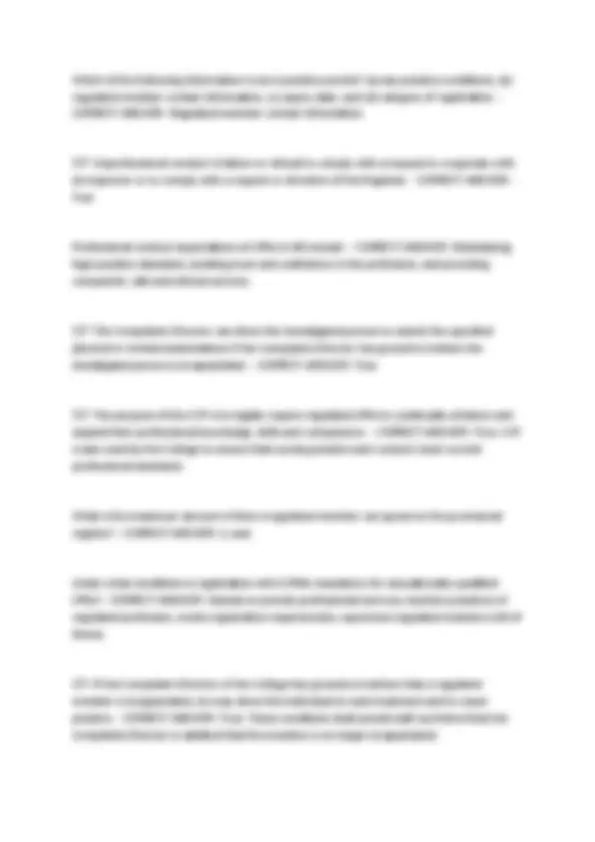
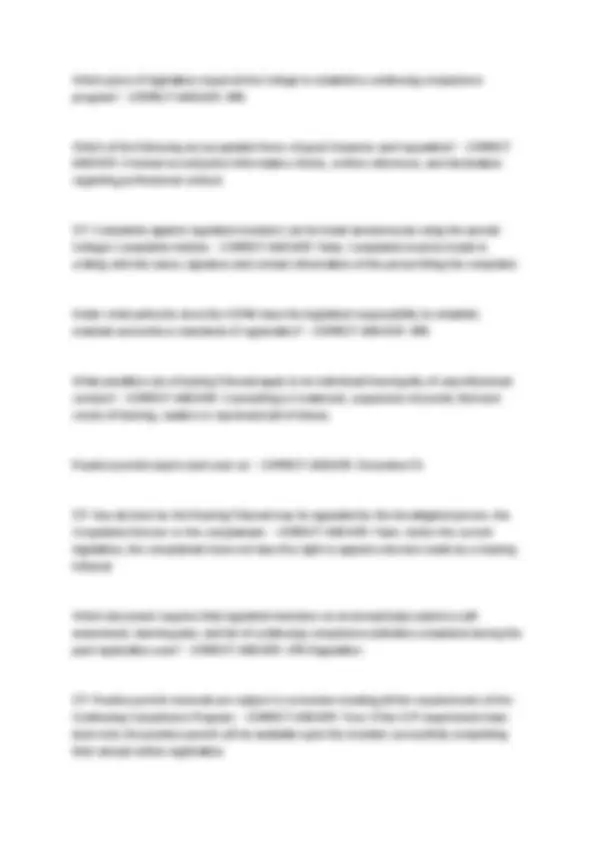
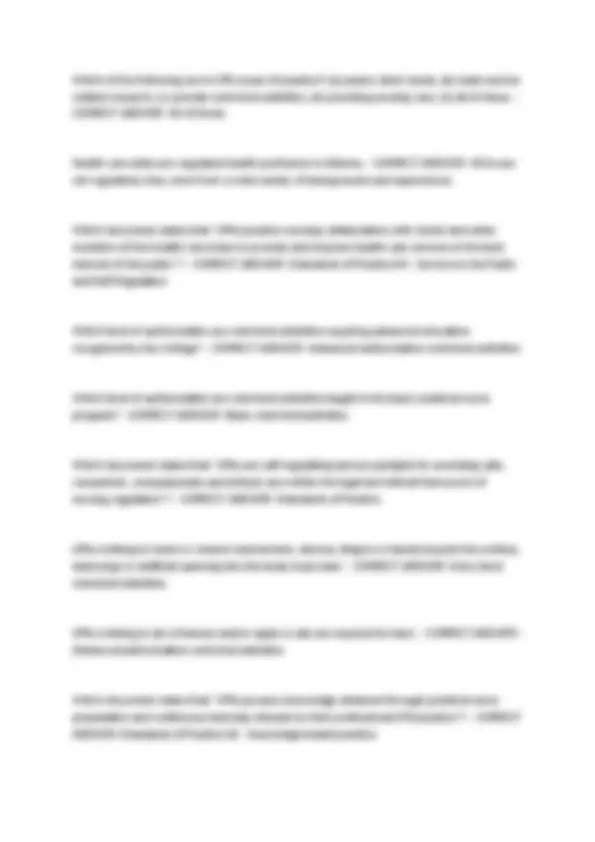
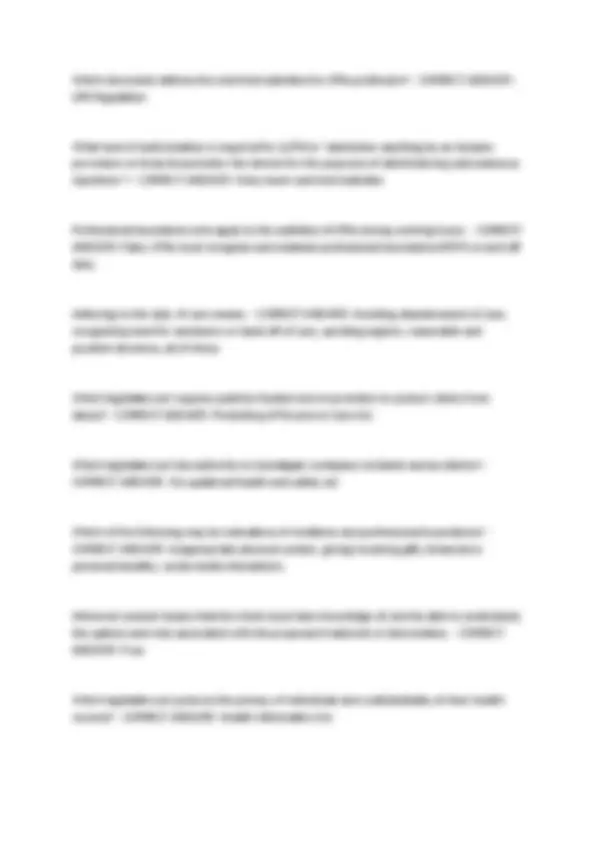
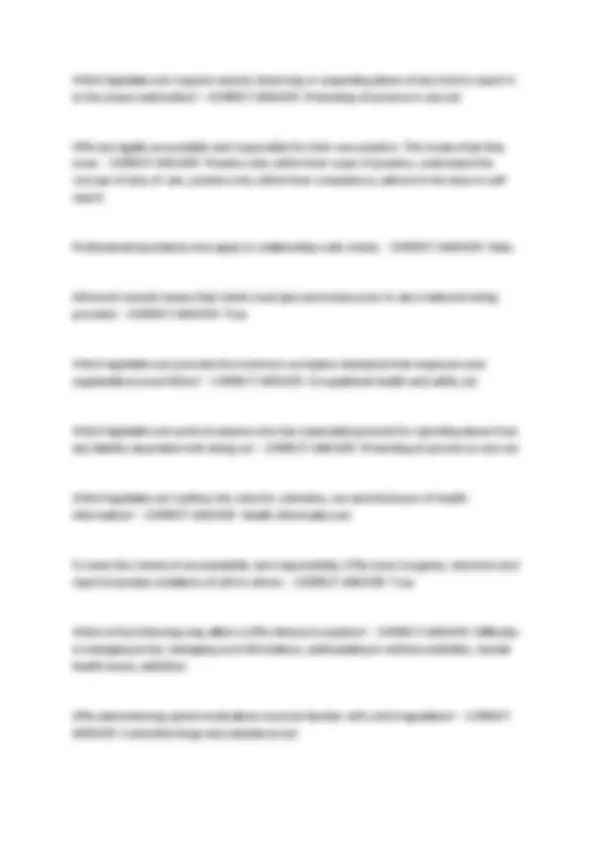
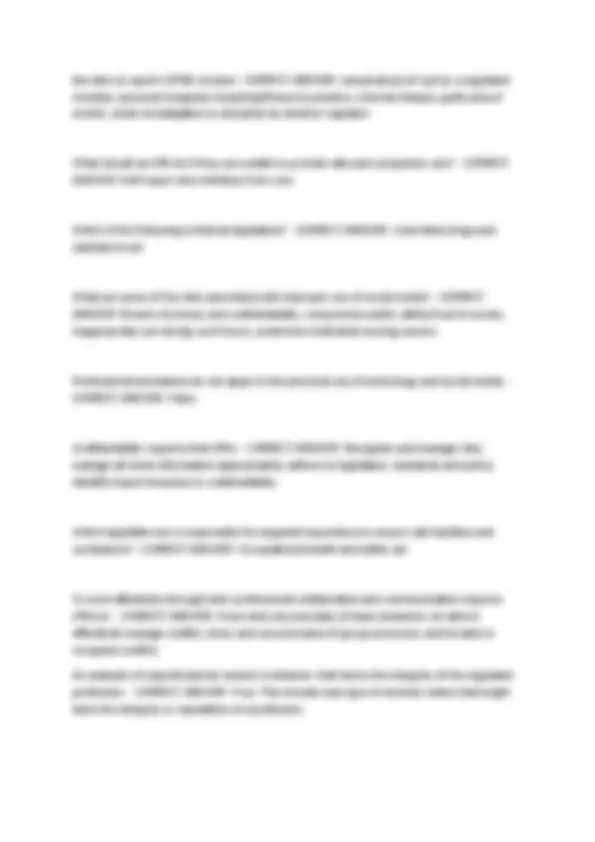
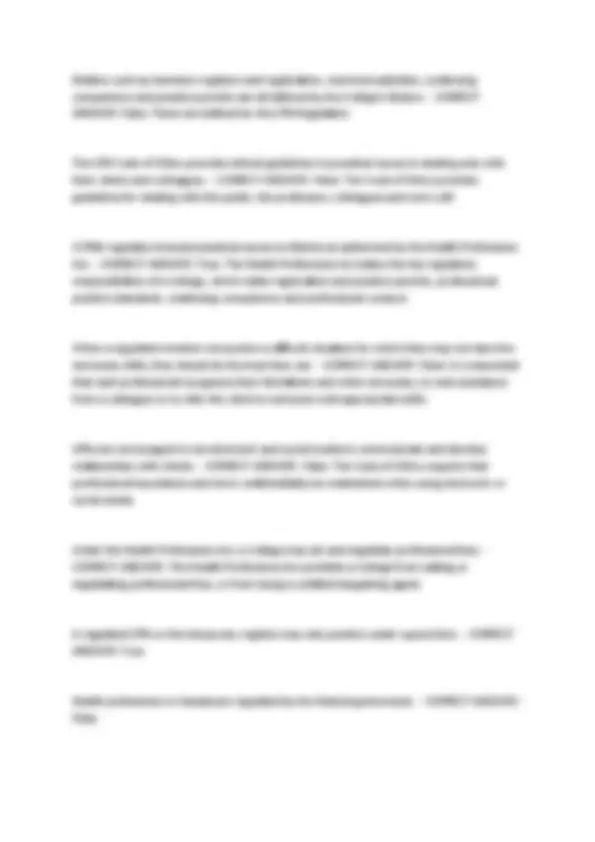
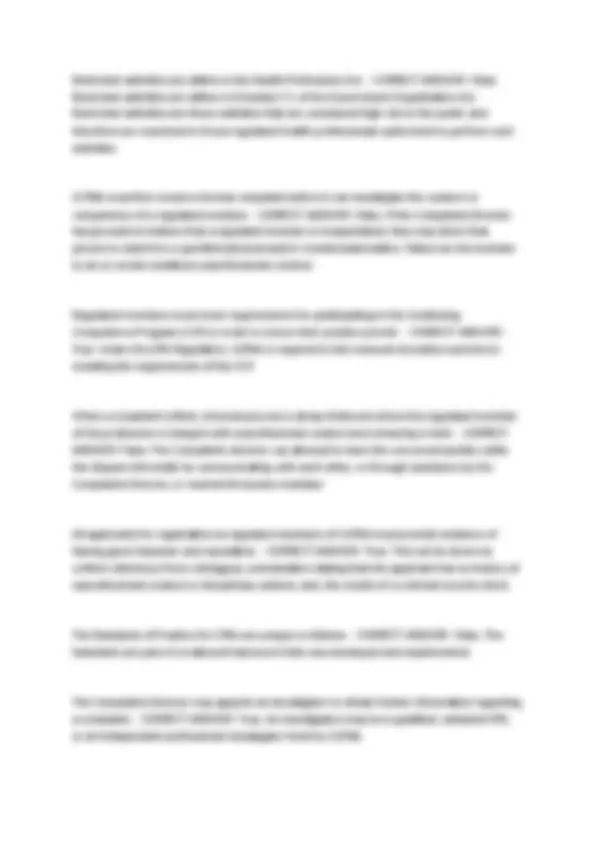
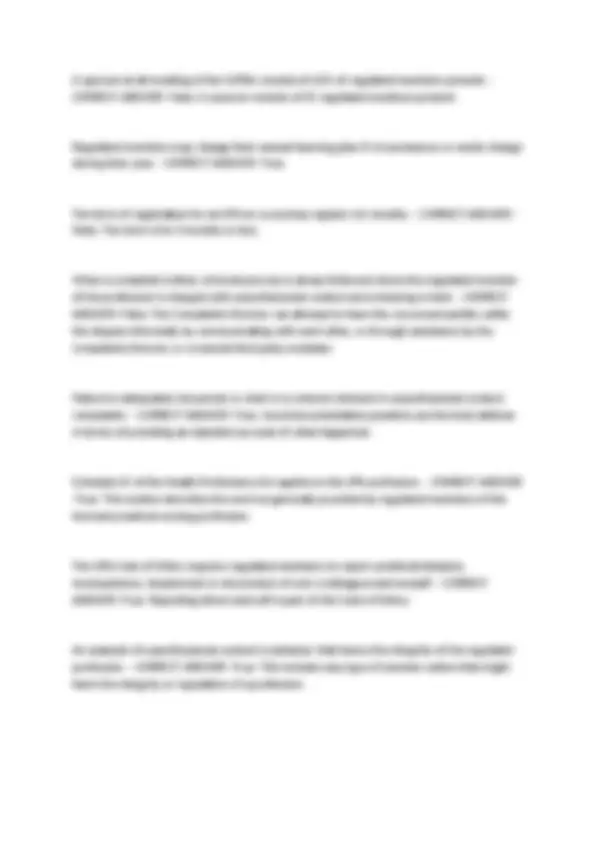
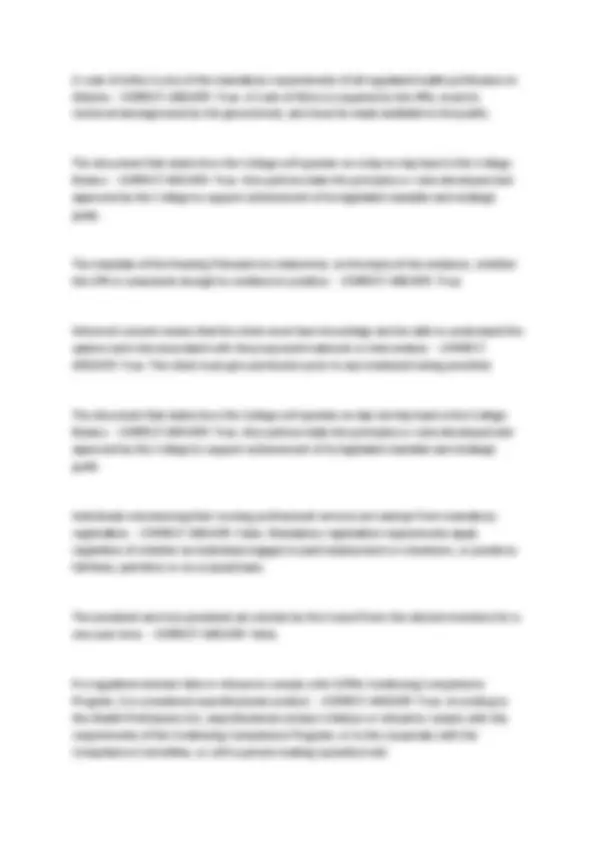
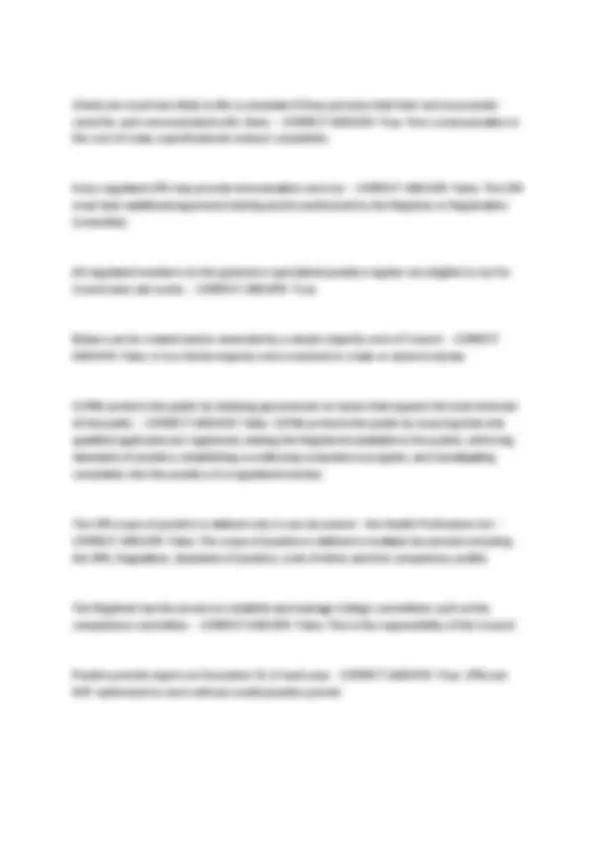
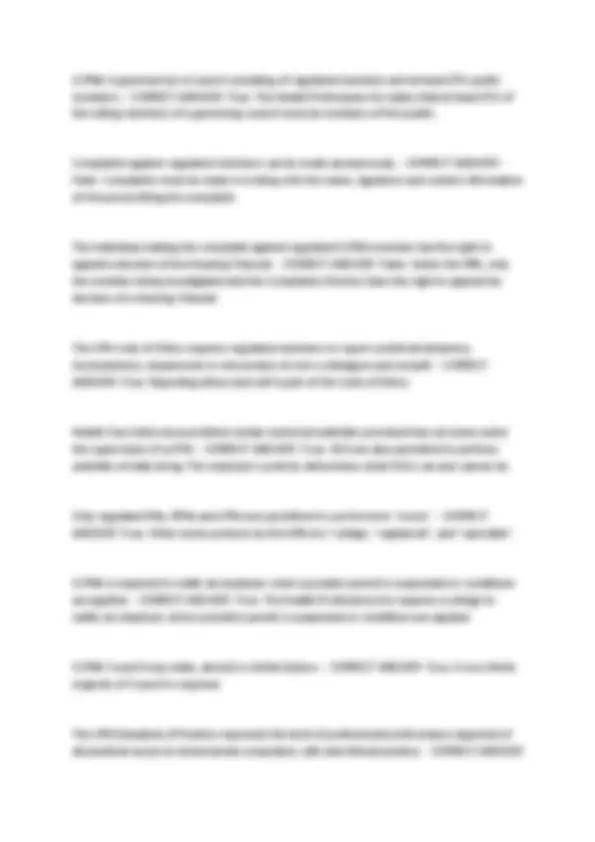
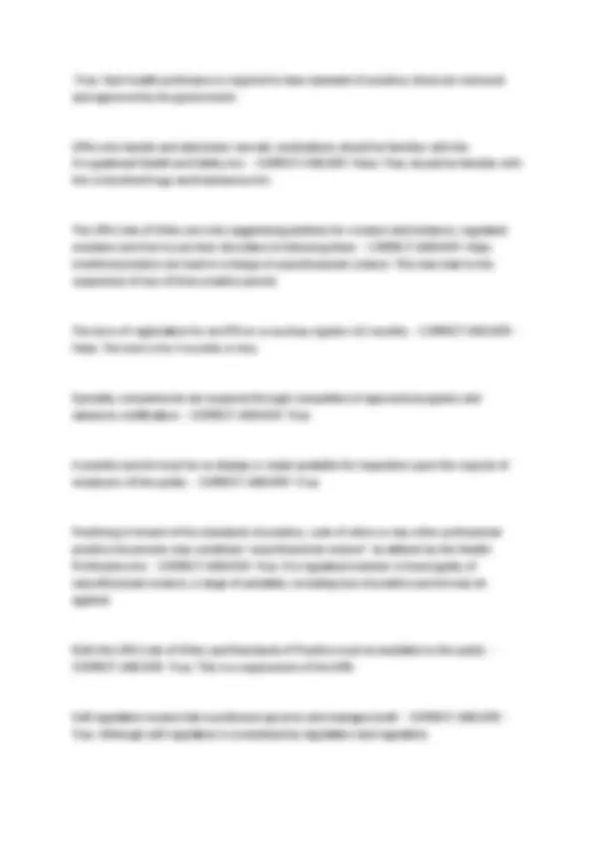
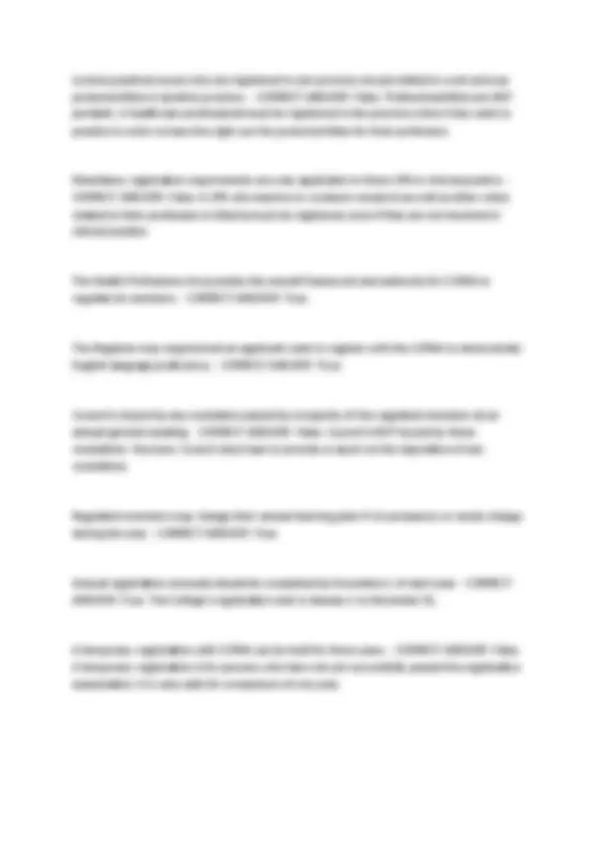
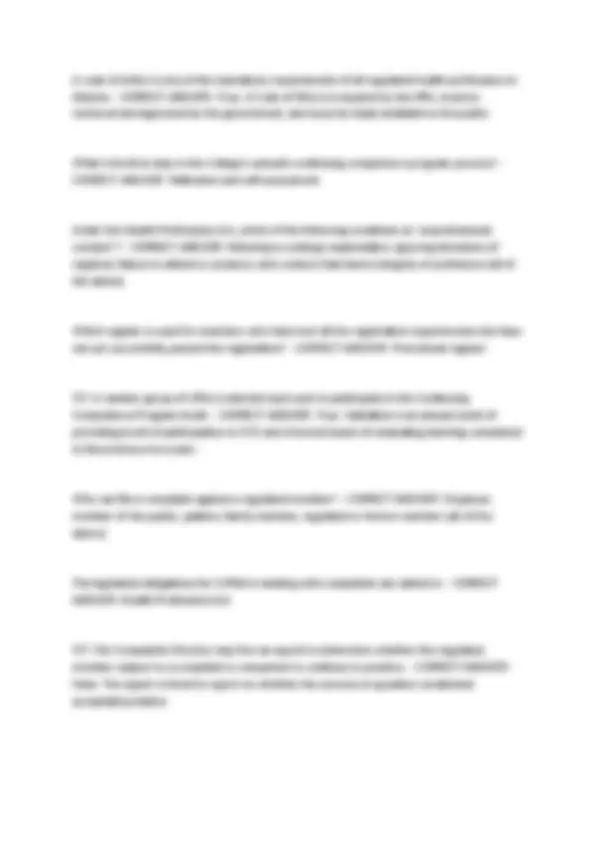
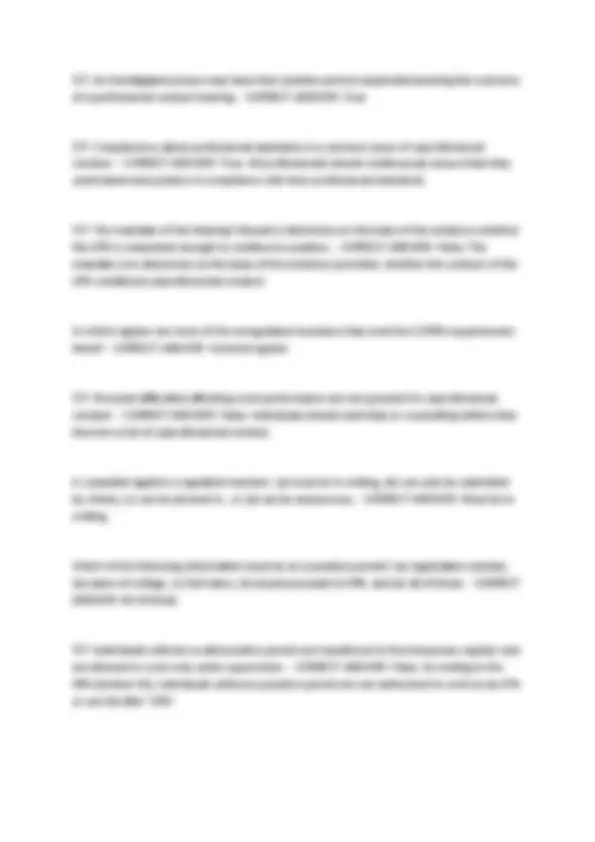
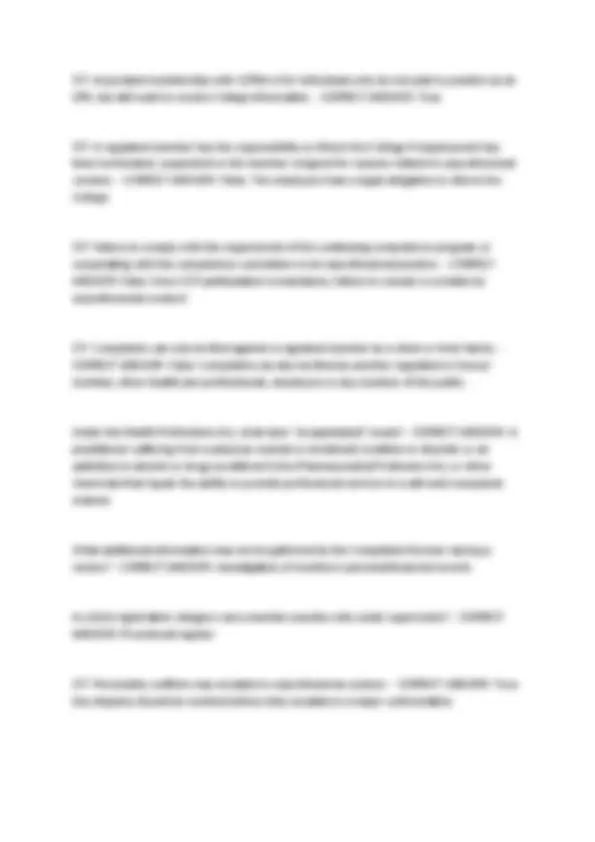
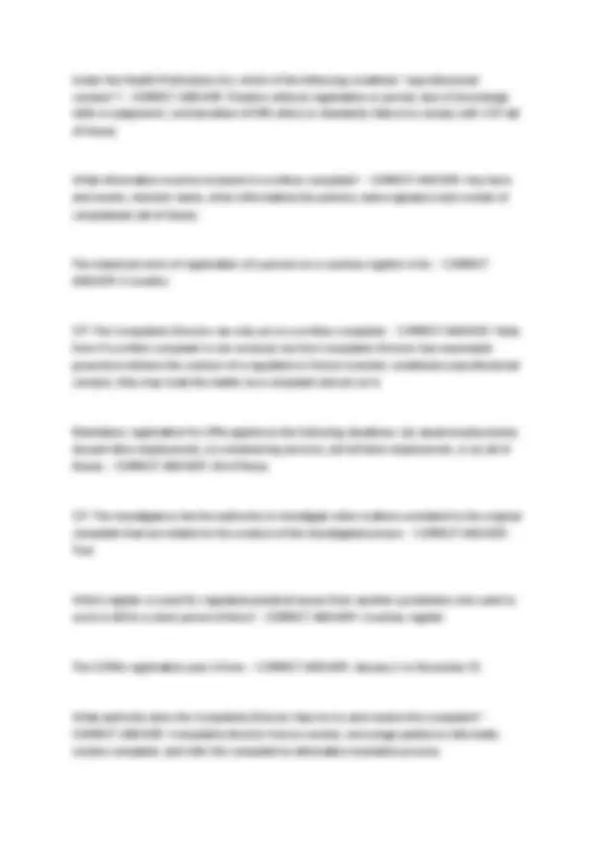
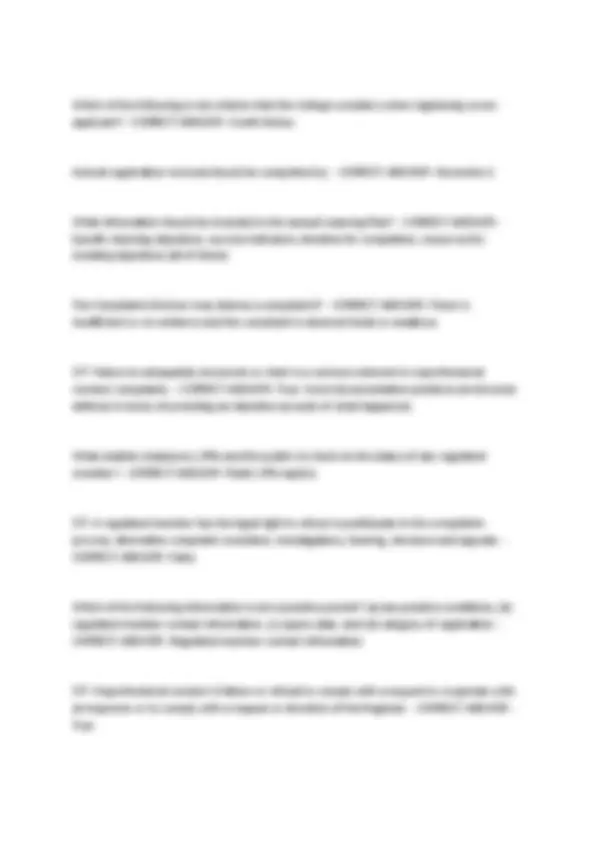
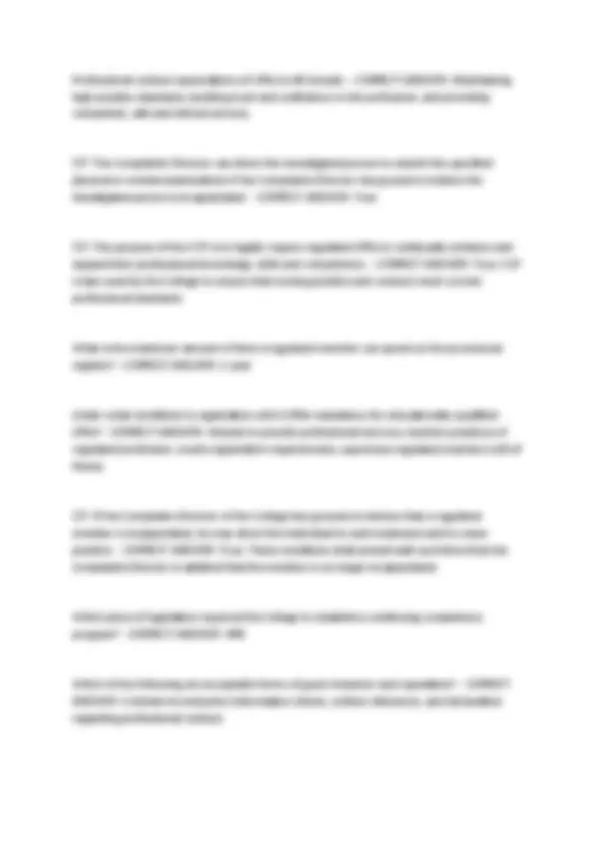
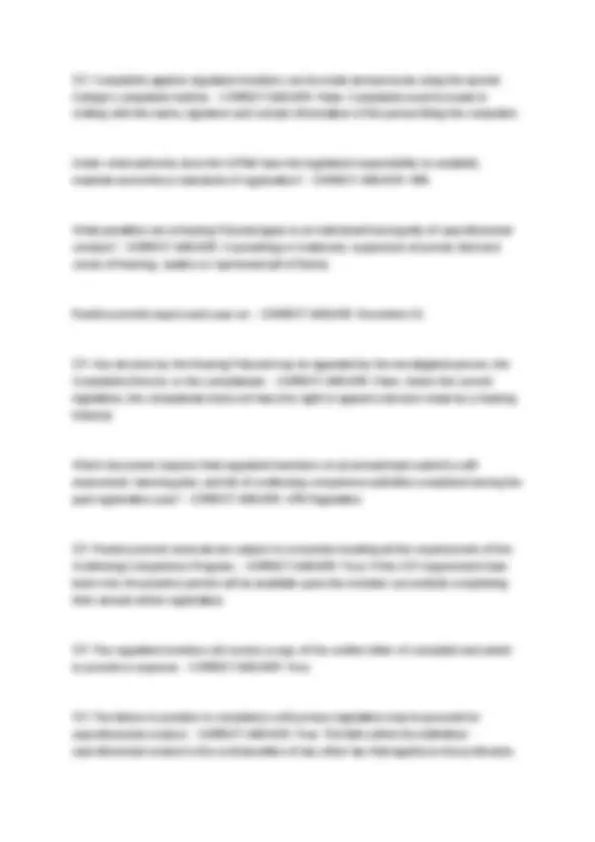
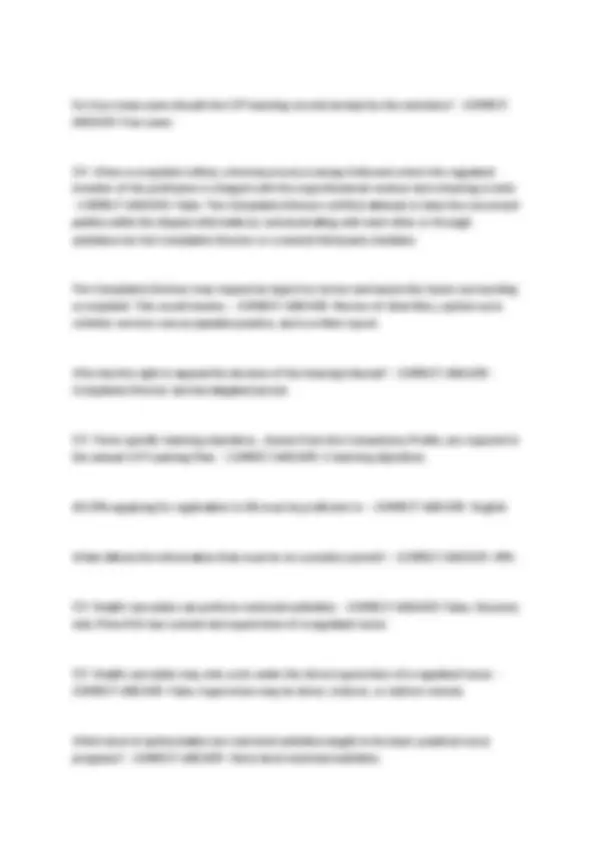
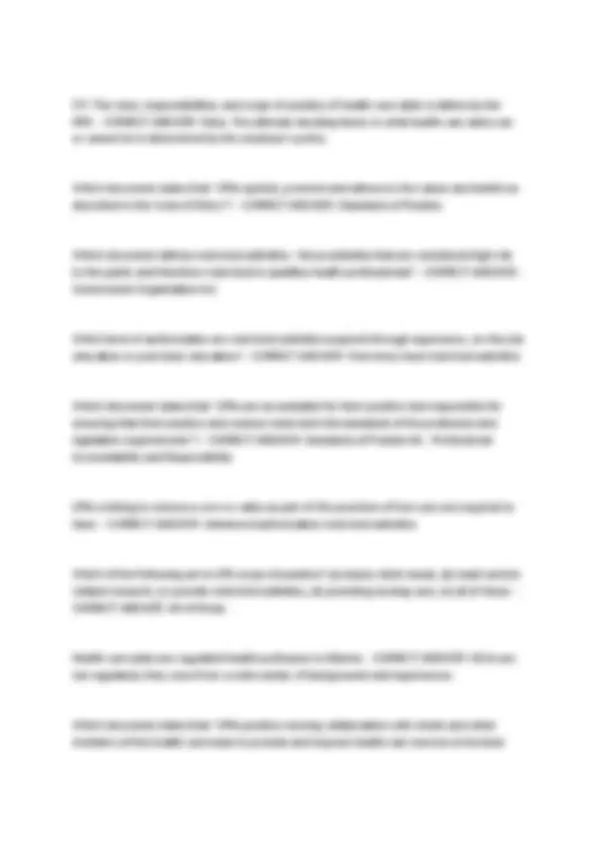
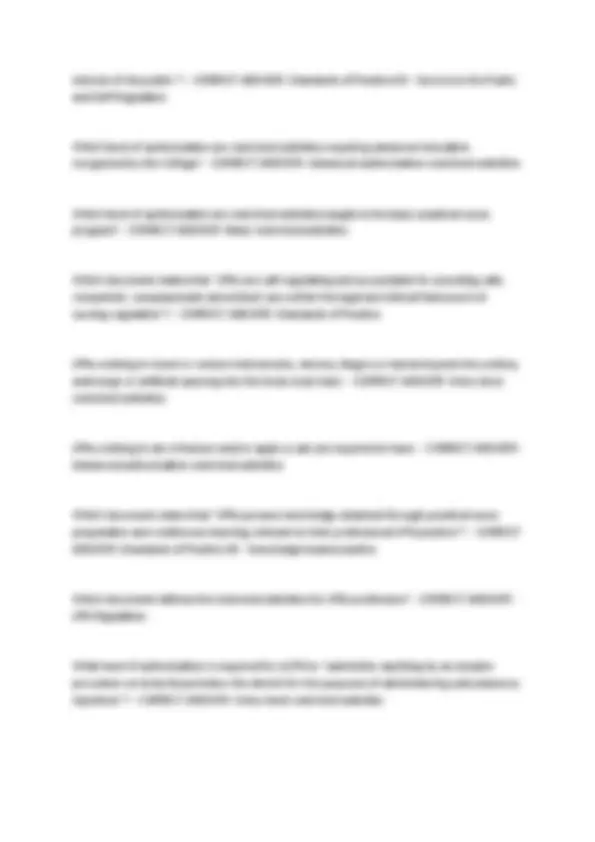
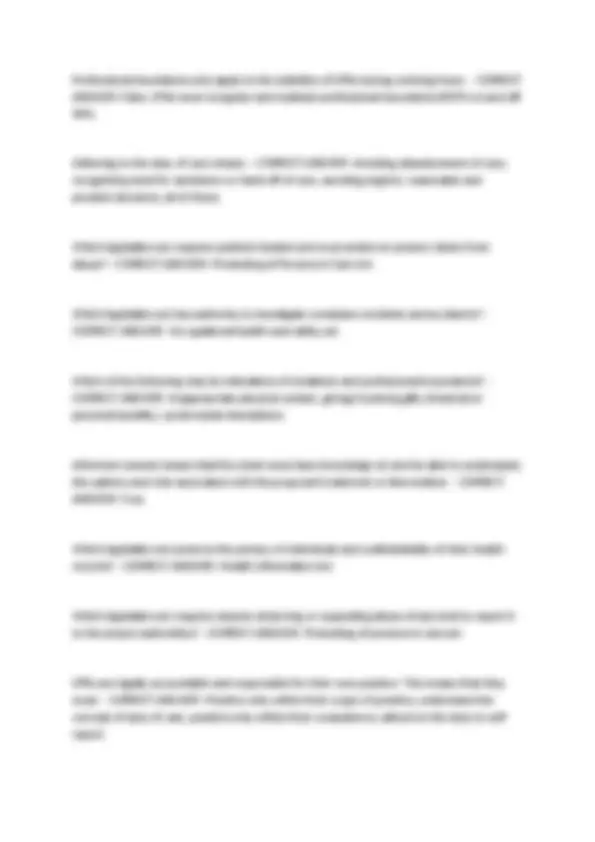
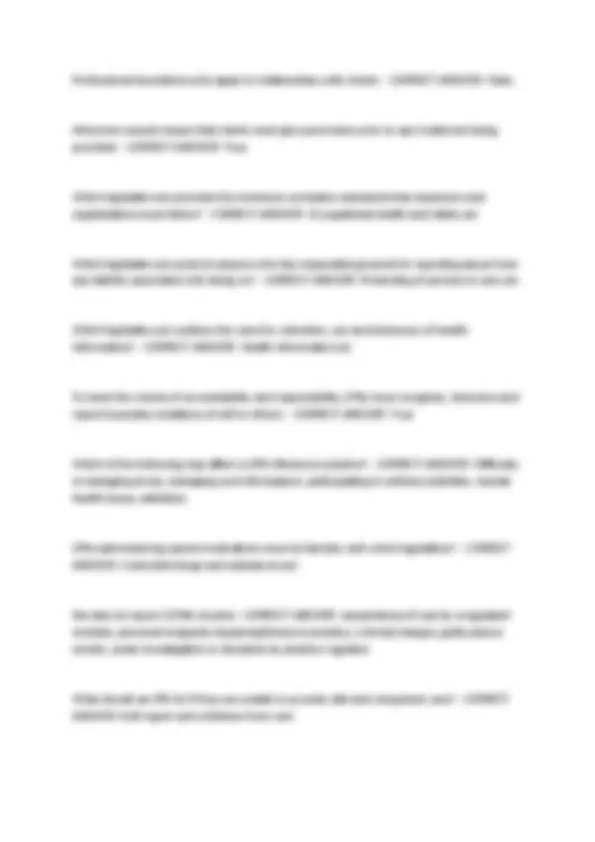
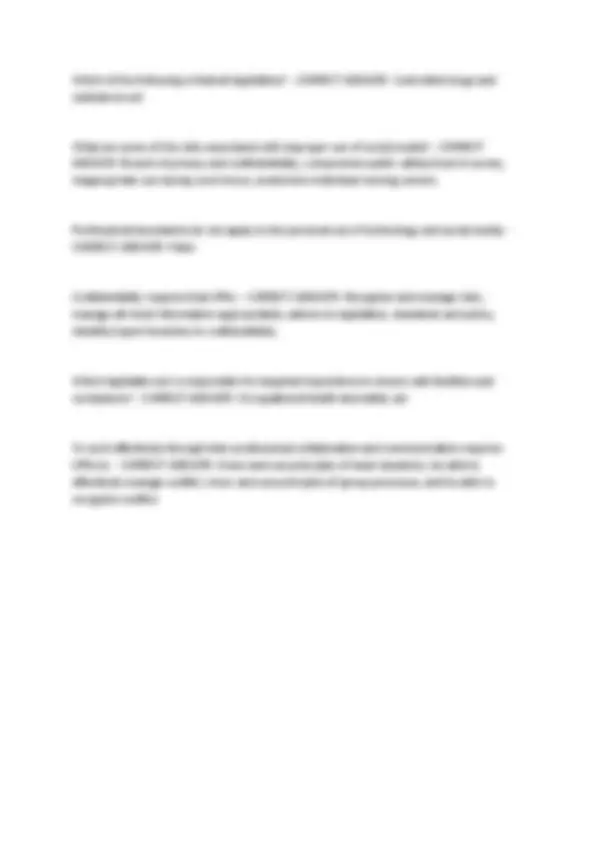


Study with the several resources on Docsity

Earn points by helping other students or get them with a premium plan


Prepare for your exams
Study with the several resources on Docsity

Earn points to download
Earn points by helping other students or get them with a premium plan
Community
Ask the community for help and clear up your study doubts
Discover the best universities in your country according to Docsity users
Free resources
Download our free guides on studying techniques, anxiety management strategies, and thesis advice from Docsity tutors
CLPNA JURISPRUDENCE EXAM CLPNA may approve programs of study and education courses for the purposes of registration requirements. - CORRECT ANSWER -True. This is one of the powers the College has under the Health Professional Act. CLPNA may approve programs of study and education courses for the purposes of registration requirements. - CORRECT ANSWER -True. This is one of the powers the College has under the Health Professional Act. An example of unprofessional conduct is behavior that harms the integrity of the regulated profession. - CORRECT ANSWER -True. This includes any type of member action that might harm the integrity or reputation of a profession. Matters such as members registers and registration, restricted activities, continuing competence and practice permits are all defined by the College's Bylaws. - CORRECT ANSWER -False. These are defined by the LPN Regulation. The LPN Code of Ethics provides ethical guidelines to practical nurses
Typology: Exams
1 / 42

This page cannot be seen from the preview
Don't miss anything!



































CLPNA may approve programs of study and education courses for the purposes of registration requirements. - CORRECT ANSWER - True. This is one of the powers the College has under the Health Professional Act. CLPNA may approve programs of study and education courses for the purposes of registration requirements. - CORRECT ANSWER - True. This is one of the powers the College has under the Health Professional Act. An example of unprofessional conduct is behavior that harms the integrity of the regulated profession. - CORRECT ANSWER - True. This includes any type of member action that might harm the integrity or reputation of a profession. Matters such as members registers and registration, restricted activities, continuing competence and practice permits are all defined by the College's Bylaws. - CORRECT ANSWER - False. These are defined by the LPN Regulation. The LPN Code of Ethics provides ethical guidelines to practical nurses in dealing only with their clients and colleagues. - CORRECT ANSWER - False. The Code of Ethics provides guidelines for dealing with the public, the profession, colleagues and one's self. CLPNA regulates licensed practical nurses in Alberta as authorized by the Health Professions Act. - CORRECT ANSWER - True. The Health Professions Act states the key regulatory responsibilities of a College, which relate registration and practice permits, professional practice standards, continuing competence and professional conduct. When a regulated member encounters a difficult situation for which they may not have the necessary skills, they should do the best they can. - CORRECT ANSWER - False. It is important that each professional recognizes their limitations and when necessary, to seek assistance from a colleague or to refer the client to someone with appropriate skills. LPNs are encouraged to use electronic and social media to communicate and develop relationships with clients. - CORRECT ANSWER - False. The Code of Ethics requires that
professional boundaries and strict confidentiality be maintained when using electronic or social media. Under the Health Professions Act, a College may set and negotiate professional fees. - CORRECT ANSWER - The Health Professions Act prohibits a College from setting or negotiating professional fees, or from being a certified bargaining agent. A regulated LPN on the temporary register may only practice under supervision. - CORRECT ANSWER - True. Health professions in Canada are regulated by the federal government. - CORRECT ANSWER - False. Restricted activities are define in the Health Professions Act. - CORRECT ANSWER - False. Restricted activities are define in Schedule 7.1 of the Government Organization Act. Restricted activities are those activities that are considered high risk to the public and therefore are restricted to those regulated health professionals authorized to perform such activities. CLPNA must first receive a formal complaint before it can investigate the conduct or competence of a regulated member. - CORRECT ANSWER - False. If the Complaints Director has grounds to believe that a regulated member is incapacitated, they may direct that person to submit to a specified physical and/or mental examination. Failure by the member to do so would constitute unprofessional conduct. Regulated members must meet requirements for participating in the Continuing Competence Program (CCP) in order to renew their practice permit. - CORRECT ANSWER - True. Under the LPN Regulation, CLPNA is required to link renewal of practice permits to meeting the requirements of the CCP. When a complaint is filed, a formal process is always followed where the regulated member of the profession is charged with unprofessional conduct and a hearing is held. - CORRECT ANSWER - False. The Complaints director can attempt to have the concerned parties settle
Schedule 10 of the Health Professions Act applies to the LPN profession. - CORRECT ANSWER
Individuals volunteering their nursing professional services are exempt from mandatory registration. - CORRECT ANSWER - False. Mandatory registration requirements apply regardless of whether an individual engages in paid employment or volunteers, or practices full-time, part-time or on a casual basis. The president and vice-president are elected by the Council from the elected members for a one-year term. - CORRECT ANSWER - False. If a regulated member fails or refuses to comply with CLPNA Continuing Competence Program, it is considered unprofessional conduct. - CORRECT ANSWER - True. According to the Health Professions Act, unprofessional conduct is failure or refusal to comply with the requirements of the Continuing Competence Program, or to the cooperate with the Competence Committee, or with a person making a practice visit. Clients are much less likely to file a complaint if they perceive that their service provider cared for, and communicated with, them. - CORRECT ANSWER - True. Poor communication is the root of many unprofessional conduct complaints. Every regulated LPN may provide immunization services. - CORRECT ANSWER - False. The LPN must have additional approved training and be authorized by the Registrar or Registration Committee. All regulated members on the general or specialized practice register are eligible to run for Council and cast a vote. - CORRECT ANSWER - True. Bylaws can be created and/or amended by a simple majority vote of Council. - CORRECT ANSWER - False. A two-thirds majority vote is needed to create or amend a bylaw. CLPNA protects the public by lobbying government on issues that support the best interests of the public. - CORRECT ANSWER - False. CLPNA protects the public by ensuring that only qualified applicants are registered; making the Registered available to the public; enforcing standards of practice; establishing a continuing competence program; and investigating complaints into the practice of a regulated member.
Only regulated RNs, RPNs and LPNs are permitted to use the term "nurse". - CORRECT ANSWER - True. Other terms protects by the HPA are "college, "registered", and "specialist". CLPNA is required to notify an employer when a practice permit is suspended or conditions are applied. - CORRECT ANSWER - True. The Health Professions Act requires a college to notify an employer when a practice permit is suspended or conditions are applied. CLPNA Council may make, amend or delete bylaws. - CORRECT ANSWER - True. A two-thirds majority of Council is required. The LPN Standards of Practice represent the level of professional performance expected of all practical nurses to demonstrate competent, safe and ethical practice. - CORRECT ANSWER
Practicing in breach of the standards of practice, code of ethics or any other professional practice documents may constitute "unprofessional conduct" as defined by the Health Professions Act. - CORRECT ANSWER - True. If a regulated member is found guilty of unprofessional conduct, a range of penalties, including loss of practice permit may be applied. Both the LPN Code of Ethics and Standards of Practice must be available to the public. - CORRECT ANSWER - True. This is a requirement of the HPA. Self-regulation means that a profession governs and manages itself. - CORRECT ANSWER - True. Although self-regulation is constrained by legislation and regulation. License practical nurses who are registered in one province are permitted to work and use protected titles in another province. - CORRECT ANSWER - False. Professional titles are NOT portable. A healthcare professional must be registered in the province where they want to practice in order to have the right use the protected titles for their profession. Mandatory registration requirements are only applicable to those LPN in clinical practice. - CORRECT ANSWER - False. A LPN who teaches or conducts research (as well as other roles) related to their profession in Alberta must be registered, even if they are not involved in clinical practice. The Health Professions Act provides the overall framework and authority for CLPNA to regulate its members. - CORRECT ANSWER - True. The Registrar may requirement an applicant want to register with the CLPNA to demonstrate English language proficiency. - CORRECT ANSWER - True. Council is bound by any resolution passed by a majority of the regulated members at an annual general meeting. - CORRECT ANSWER - False. Council is NOT bound by these resolutions. However, Council does have to provide a report on the deposition of any resolutions.
The legislated obligations for CLPNA in dealing with complaints are stated in: - CORRECT ANSWER - Health Professions Act T/F: The Complaints Director may hire an expert to determine whether the regulated member subject to a complaint is competent to continue to practice. - CORRECT ANSWER - False. The expert is hired to report on whether the services in question constituted acceptable practice. T/F: An investigated person may have their practice permit suspended pending the outcome of a professional conduct hearing. - CORRECT ANSWER - True. T/F: Complacency about professional standards is a common cause of unprofessional conduct. - CORRECT ANSWER - True. All professionals should continuously ensure that they understand and practice in compliance with their professional standards. T/F: The mandate of the Hearing Tribunal is determine on the basis of the evidence whether the LPN is competent enough to continue to practice. - CORRECT ANSWER - False. The mandate is to determine on the basis of the evidence provided, whether the conduct of the LPN constitutes unprofessional conduct. In which register are most of the unregulated members that meet the CLPNA requirements listed? - CORRECT ANSWER - General register T/F: Personal difficulties affecting work performance are not grounds for unprofessional conduct. - CORRECT ANSWER - False. Individuals should seek help or counselling before they become a risk of unprofessional conduct. A complaint against a regulated member: (a) must be in writing, (b) can only be submitted by clients, (c) can be phoned in , or (d) can be anonymous. - CORRECT ANSWER - Must be in writing.
Which of the following information must be on a practice permit? (a) registration number, (b) name of college, (c) full name, (d) issued pursuant to HPA, and (e) all of these. - CORRECT ANSWER - All of these. T/F: Individuals without a valid practice permit are transferred to the temporary register and are allowed to work only under supervision. - CORRECT ANSWER - False. According to the HPA (Section 43), individuals without a practice permit are not authorized to work as an LPN or use the title "LPN". T/F: Associated membership with CLPNA is for individuals who do not plan to practice as an LPN, but still want to receive College information. - CORRECT ANSWER - True. T/F: A regulated member has the responsibility to inform the College if employment has been terminated, suspended or the member resigned for reasons related to unprofessional conduct. - CORRECT ANSWER - False. The employers have a legal obligation to inform the College. T/F: Failure to comply with the requirement of the continuing competence program or cooperating with the competence committee is not unprofessional practice. - CORRECT ANSWER - False. Since CCP participation is mandatory, failure to comply is considered unprofessional conduct. T/F: Complaints can only be filed against a regulated member by a client or their family. - CORRECT ANSWER - False. Complaints can also be filed by another regulated or former member, other healthcare professionals, employers or any member of the public. Under the Health Professions Act, what does "incapacitated" mean? - CORRECT ANSWER - A practitioner suffering from a physical, mental or emotional condition or disorder or an addiction to alcohol or drugs as defined in the Pharmaceutical Profession Act, or other chemicals that impair the ability to provide professional services in a safe and competent manner. What additional information may not be gathered by the Complaints Director during a review? - CORRECT ANSWER - Investigation of member's personal financial records
Which register us used for regulated practical nurses from another jurisdiction who want to work in AB for a short period of time? - CORRECT ANSWER - Courtesy register The CLPNA registration year is from: - CORRECT ANSWER - January 1 to December 31 What authority does the Complaints Director have to try and resolve the complaint? - CORRECT ANSWER - Complaints director tries to resolve, encourage parties to informally resolve complaint, and refer the complaint to alternative resolution process. Which of the following is not a factor that the College considers when registering a new applicant? - CORRECT ANSWER - Credit history Annual registration renewal should be completed by: - CORRECT ANSWER - December 1 What information should be included in the annual Learning Plan? - CORRECT ANSWER - Specific learning objectives, success indicators, timeline for completion, resources for meeting objectives (all of these) The Complaints Director may dismiss a complaint if: - CORRECT ANSWER - There is insufficient or no evidence and the complaint is deemed trivial or vexatious T/F: Failure to adequately document or chart is a common element in unprofessional conduct complaints. - CORRECT ANSWER - True. Good documentation practices are the best defense in terms of providing an objective account of what happened. What enables employers, LPNs and the public to check on the status of any regulated member? - CORRECT ANSWER - Public LPN registry T/F: A regulated member has the legal right to refuse to participate in the complaints process, alternative complaint resolution, investigations, hearing, decisions and appeals. - CORRECT ANSWER - False.
Which of the following information is not a practice permit? (a) any practice conditions, (b) regulated member contact information, (c) expiry date, and (d) category of registration. - CORRECT ANSWER - Regulated member contact information. T/F: Unprofessional conduct is failure or refusal to comply with a request to cooperate with an inspector or to comply with a request or direction of the Registrar. - CORRECT ANSWER - True Professional conduct expectations of LPNs in AB include: - CORRECT ANSWER - Maintaining high practice standards, building trust and confidence in the profession, and providing competent, safe and ethical services. T/F: The Complaints Director can direct the investigated person to submit the specified physical or mental examinations if the Complaints Director has ground to believe the investigated person is incapacitated. - CORRECT ANSWER - True T/F: The purpose of the CCP is to legally require regulated LPNs to continually enhance and expand their professional knowledge, skills and competence. - CORRECT ANSWER - True. CCP is also used by the College to ensure that nursing practice and conduct meet current professional standards. What is the maximum amount of time a regulated member can spend on the provisional register? - CORRECT ANSWER - 1 year Under what conditions is registration with CLPNA mandatory for educationally-qualified LPNs? - CORRECT ANSWER - Intends to provide professional services, teachers practices of regulated profession, meets registration requirements, supervises regulated members (All of these). T/F: If the Complaints Director of the College has grounds to believe that a regulated member is incapacitated, he may direct the individual to seek treatment and to cease practice. - CORRECT ANSWER - True. These conditions shall prevail until such time that the Complaints Director is satisfied that the member is no longer incapacitated.
T/F: The regulated member will receive a copy of the written letter of complaint and asked to provide a response. - CORRECT ANSWER - True. T/F: The failure to practice in compliance with privacy legislation may be grounds for unprofessional conduct. - CORRECT ANSWER - True. This falls within the definition - unprofessional conduct is the contravention of any other law that applies to the profession. For how many years should the CCP learning records be kept by the members? - CORRECT ANSWER - Four years T/F: When a complaint is filed, a formal process is always followed where the regulated member of the profession is charged with the unprofessional conduct and a hearing is held.
T/F: Health care aides can perform restricted activities. - CORRECT ANSWER - False. However, only if the HCA has consent and supervision of a regulated nurse. T/F: Health care aides may only work under the direct supervision of a regulated nurse. - CORRECT ANSWER - False. Supervision may be direct, indirect, or indirect remote. Which level of authorization are restricted activities taught in the basic practical nurse programs? - CORRECT ANSWER - Entry-level restricted activities. T/F: The roles, responsibilities, and scope of practice of health care aides is define by the HPA. - CORRECT ANSWER - False. The ultimate deciding factor in what health care aides can or cannot do is determined by the employer's policy. Which document states that "LPNs uphold, promote and adhere to the values and beliefs as described in the Code of Ethics"? - CORRECT ANSWER - Standards of Practice. Which document defines restricted activities - those activities that are considered high risk to the public and therefore restricted to qualifies health professionals? - CORRECT ANSWER - Government Organization Act Which level of authorization are restricted activities acquired through experience, on-the-job education or post-basic education? - CORRECT ANSWER - Post entry-level restricted activities Which document states that "LPNs are accountable for their practice and responsible for ensuring that their practice and conduct meet both the standards of the profession and legislative requirements"? - CORRECT ANSWER - Standards of Practice #1 - Professional Accountability and Responsibility LPNs wishing to remove a corn or callus as part of the provision of foot care are required to have: - CORRECT ANSWER - Advanced authorization restricted activities
Which document defines the restricted activities for LPNs profession? - CORRECT ANSWER - LPN Regulation What level of authorization is required for a LPN to "administer anything by an invasive procedure on body tissue below the dermis for the purposes of administering subcutaneous injections"? - CORRECT ANSWER - Entry-level restricted activities Professional boundaries only apply to the activities of LPNs during working hours. - CORRECT ANSWER - False. LPNs must recognize and maintain professional boundaries BOTH on and off duty. Adhering to the duty of care means: - CORRECT ANSWER - Avoiding abandonment of care, recognizing need for assistance or hand off of care, avoiding neglect, reasonable and prudent decisions, all of these. Which legislative act requires publicly-funded service providers to protect clients from abuse? - CORRECT ANSWER - Protecting of Persons in Care Act Which legislative act has authority to investigate workplace incidents and accidents? - CORRECT ANSWER - Occupational health and safety act Which of the following may be indications of violations and professional boundaries? - CORRECT ANSWER - Inappropriate physical contact, giving/receiving gifts, financial or personal benefits, social media interactions. Informed consent means that the client must have knowledge of, and be able to understand, the options and risks associated with the proposed treatment or intervention. - CORRECT ANSWER - True. Which legislative act protects the privacy of individuals and confidentiality of their health records? - CORRECT ANSWER - Health Information Act
Which legislative act requires anyone observing or suspecting abuse of any kind to report it to the proper authorities? - CORRECT ANSWER - Protecting of persons in care act LPNs are legally accountable and responsible for their own practice. This means that they must: - CORRECT ANSWER - Practice only within their scope of practice, understand the concept of duty of care, practice only within their competence, adhere to the duty to self- report. Professional boundaries only apply to relationships with clients. - CORRECT ANSWER - False. Informed consent means that clients must give permission prior to any treatment being provided. - CORRECT ANSWER - True. Which legislative act provides the minimum workplace standards that employers and organizations must follow? - CORRECT ANSWER - Occupational health and safety act Which legislative act protects anyone who has reasonable grounds for reporting abuse from any liability associated with doing so? - CORRECT ANSWER - Protecting of persons in care act Which legislative act outlines the rules for collection, use and disclosure of health information? - CORRECT ANSWER - Health information act To meet the criteria of accountability and responsibility, LPNs must recognize, intervene and report boundary violations of self or others. - CORRECT ANSWER - True Which of the following may affect a LPN's fitness to practice? - CORRECT ANSWER - Difficulty in managing stress, managing work-life balance, participating in wellness activities, mental health issues, addiction. LPNs administering opioid medications must be familiar with which legislation? - CORRECT ANSWER - Controlled drugs and substances act